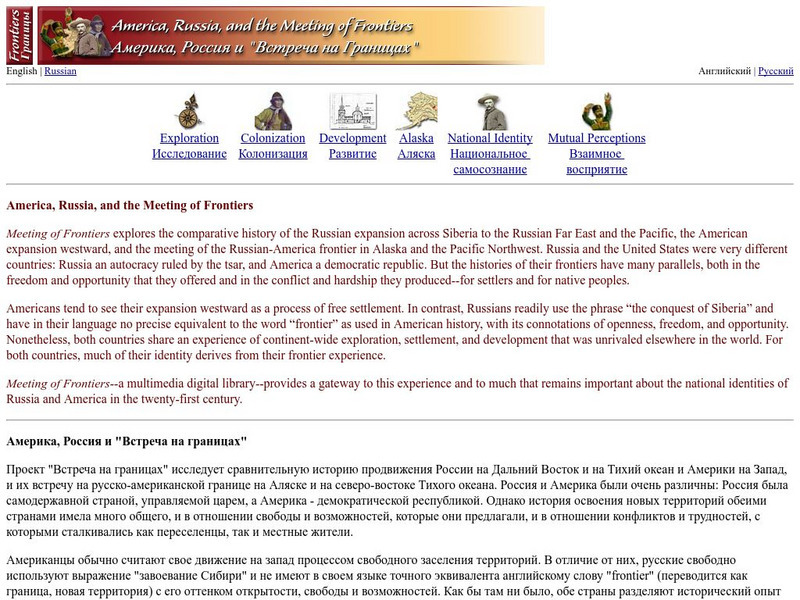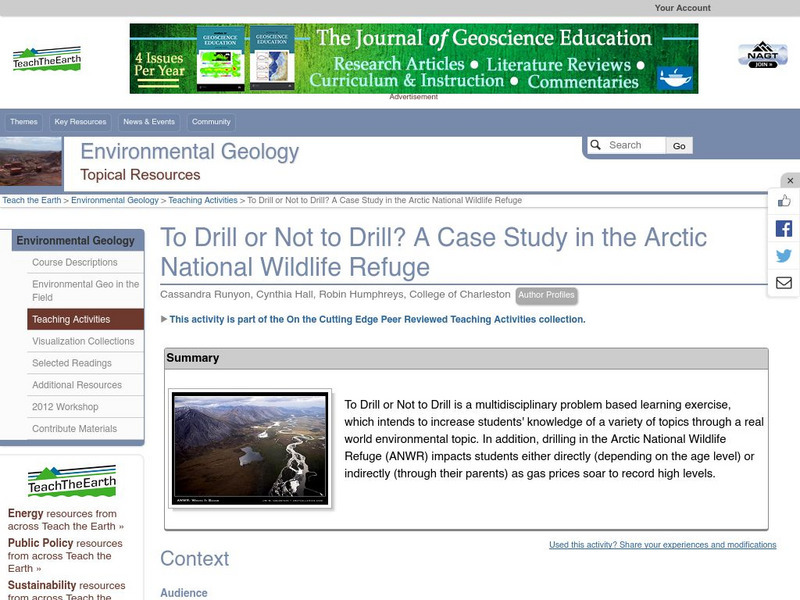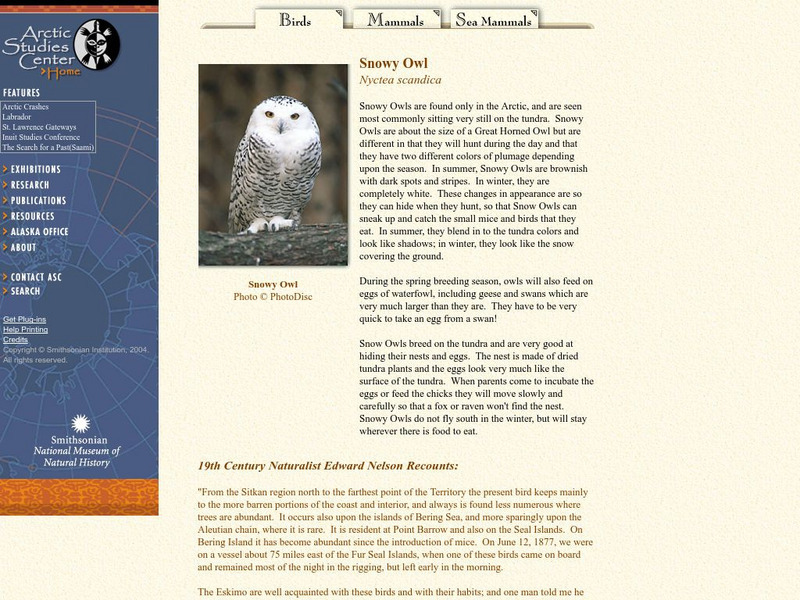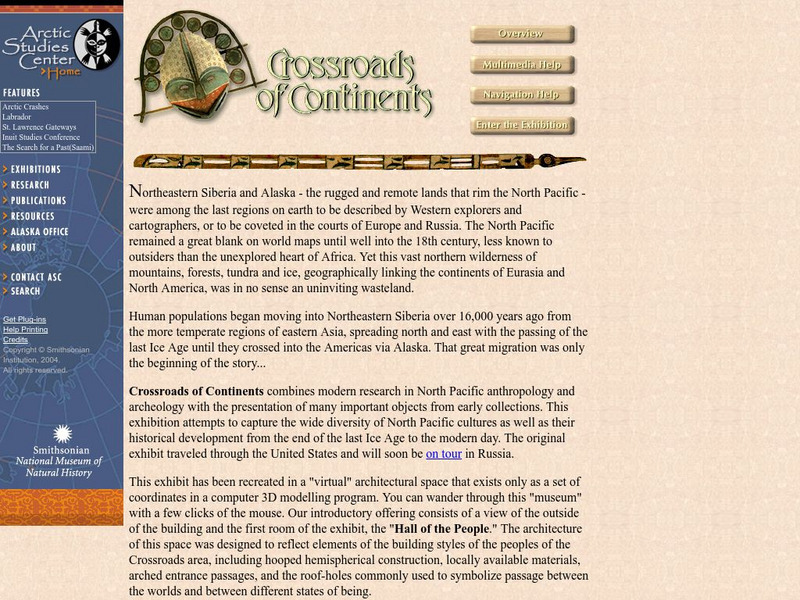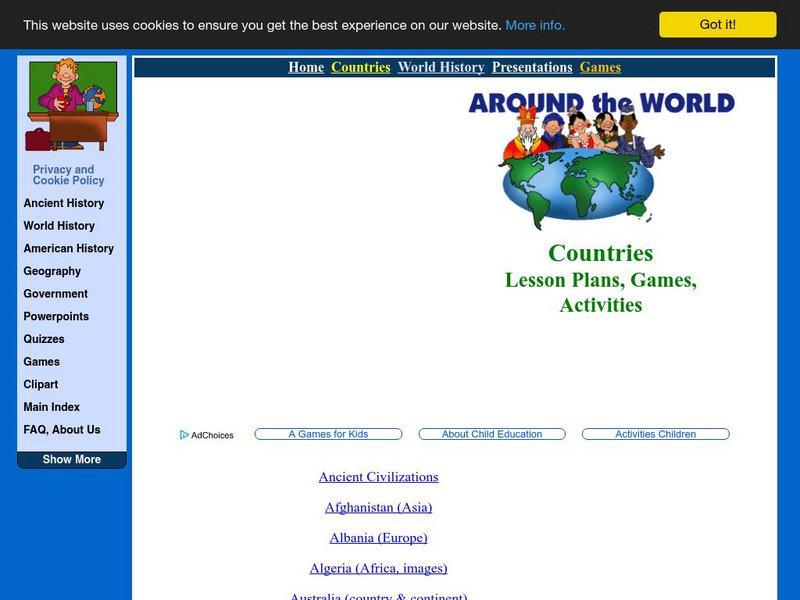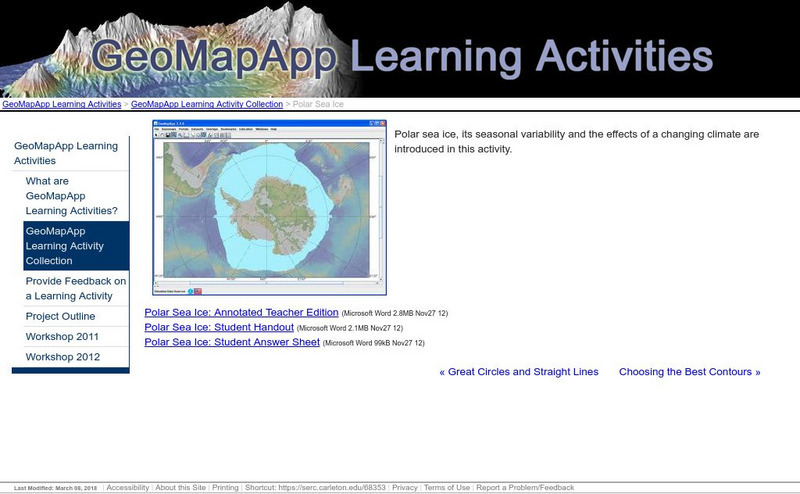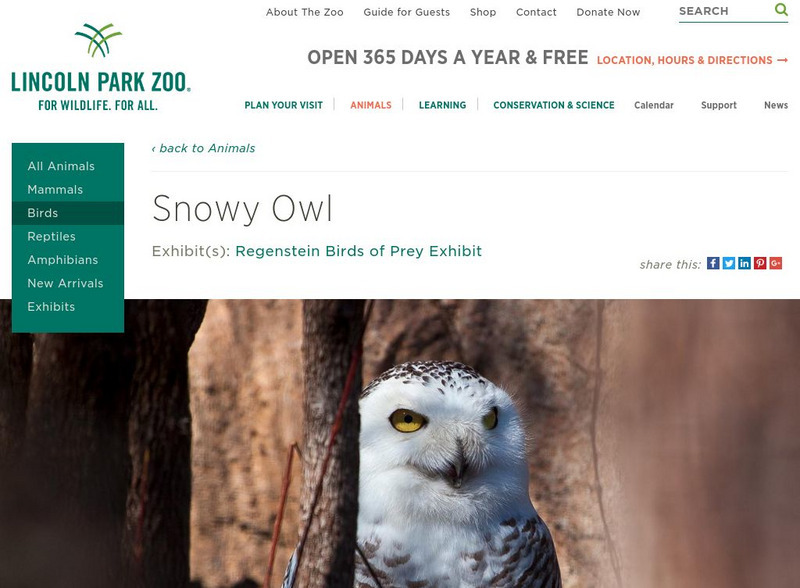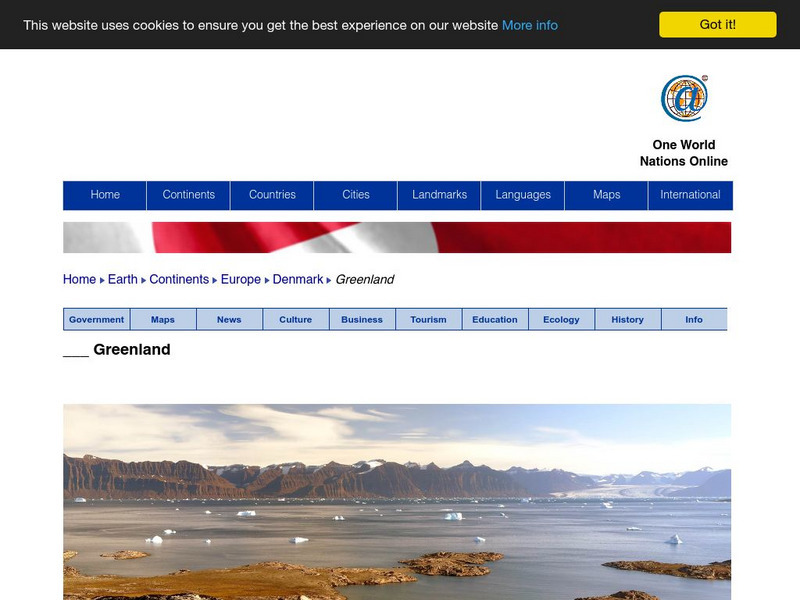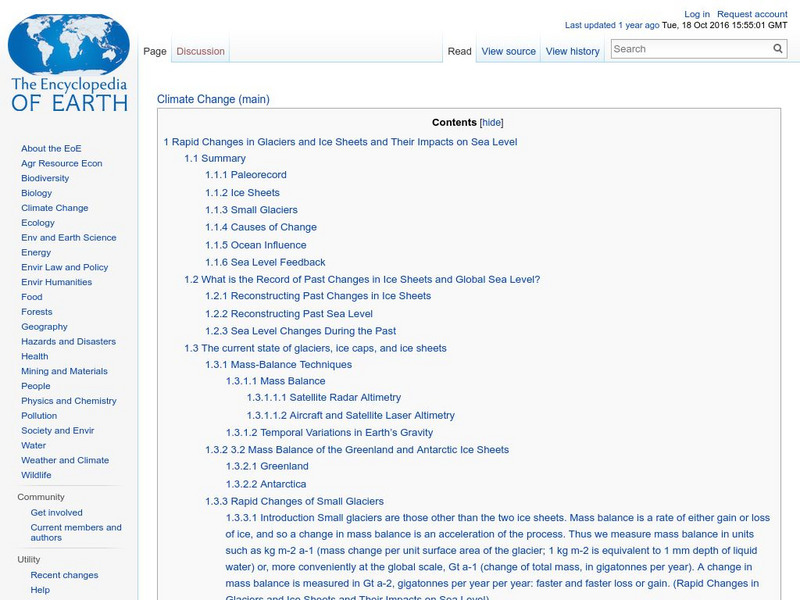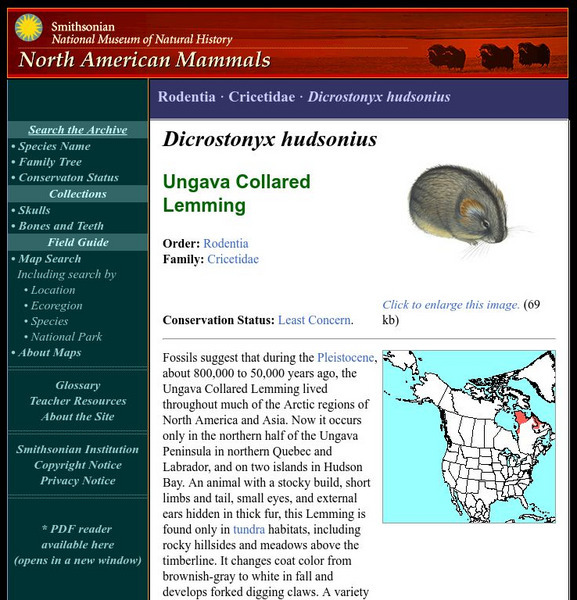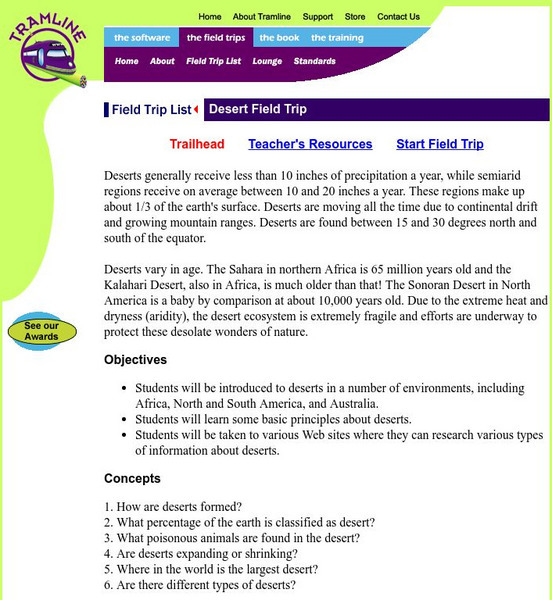Hi, what do you want to do?
Canadian Wildlife Federation
Hinterland Who's Who: Muskox
Get the facts about the muskox. Besides finding a detailed description of this resident of Canada?s arctic tundra, you?ll also learn about some of its unique facts and characteristics. Also included in this Mammal Fact Sheet on the...
Smithsonian Institution
National Museum of Natural History: Looking Both Ways
This is an interactive exhibit from the Smithsonian Arctic Studies Center featuring the Alaskan Native Alutiiqs. Learn much information about the people, their culture, and see where they live.
Library of Congress
Loc: America, Russia & Frontier Meeting
This Web site is a multimedia English-Russian digital resource that describes the American westward-Russian eastward explorations and their frontier meeting.
Other
Primer on Climate Change and Human Health [Pdf]
A comprehensive guide to climate change in Canada. This site offers both a national look and then looks at the implications of climate change on specific regions and provinces.
Science Education Resource Center at Carleton College
Serc: To Drill or Not to Drill? Case Study in Arctic National Wildlife Refuge
This lesson intends to increase students' knowledge of a variety of topics through a real world environmental topic.
Smithsonian Institution
National Museum of Natural History: Muskox
This site takes a very brief look at the muskox as an arctic creature. Several photographs are also provided.
Smithsonian Institution
National Museum of Natural History: Snowy Owl
This Smithsonian website has a brief, but thorough, article on the Snowy Owl that also includes a picture and an extensive quote from the 19th Century naturalist Edward Nelson.
Smithsonian Institution
National Museum of Natural History: Crossroads of Continents
Very interesting Smithsonian web exhibition on the culture of the peoples surrounding the Bering Strait. Enter the museum to find lost cultures due to the Cold War. Fun museum to click around in!
Lin and Don Donn
Lin and Don Donn: Countries and Continents
This resource provides links to ideas and for teaching about the Arctic Circle and about the Antarctic. There are also links to additional sites.
Smithsonian Institution
National Museum of Natural History: Tufted Puffin
This Smithsonian website has a brief, but thorough, article on the Tufted Puffin. It also includes pictures and an extensive quote from 19th Century naturalist Edward Nelson.
Science Education Resource Center at Carleton College
Serc: Polar Sea Ice
Polar sea ice, its seasonal variability, and the impact of a changing climate are investigated in this activity. Students will also explore the differences between polar regions that result from Antarctica being a continent and the north...
Lincoln Park Zoo
Lincoln Park Zoo: Snowy Owl
Lincoln Park Zoo presents facts on the snowy owl, including its physical description, it's habitat, it's niche, and it's life history.
Nations Online Project
Nations Online: Greenland
Features a country profile of Greenland, the world's largest island , background details, and numerous links to comprehensive information on the islands culture, history, geography, economy, environment, population, news, government, and...
University of Guelph
Canada's Polar Environments
This site is a set of images along with volumes of information make this site a treasure trove. The site has satellite images.
Other
Scott Polar Research Institute: Polar Bears
Here you can learn about polar bears: where they live, what they eat, and what each part of their body is adapted for.
Curated OER
Etc: Maps Etc: Elevations of the Asian Continent, 1912
An orographic map of Asia from 1912 showing average elevations and land features of the region. The map uses color-contouring to show land elevations from depressions below sea level to above 12,000 feet. Offshore fathom contour lines...
Curated OER
Educational Technology Clearinghouse: Maps Etc: The Dominion of Canada, 1911
A map from 1911 of the Dominion of Canada showing the boundaries of the provinces and territories north to Grant Island above the Arctic Circle, major cities, existing and proposed railways, mountain systems, lakes, rivers, coastal...
PBS
Pbs Nature: Penguins
Did you know that penguins can survive for more than 100 days without food or water? Discover more educational facts about these fascinating birds when you explore this site.
Encyclopedia of Earth
Encyclopedia of Earth: Rapid Changes in Glaciers and Ice Sheets
The world's glaciers and ice sheets are melting according to this extensive report. It makes recommendations on how to monitor this situation, explains what we know about the past when there was much less ice in the world, describes what...
Smithsonian Institution
National Museum of Natural History: American Mammals: Ungava Collared Lemming
Fossils suggest that during the Pleistocene, about 800,000 to 50,000 years ago, the Ungava Collared Lemming lived throughout much of the Arctic regions of North America and Asia. Now it occurs only in the northern half of the Ungava...
Other
Physical geography.net: Introduction to the Atmosphere
A very detailed description of air masses, how they move and interact, and what weather takes place when this happens.
Virtual Museum of Canada
Virtual Museum of Canada: Community Stories: Tuhaalruuqtut Ancestral Sounds
With the use of Inuit Art, photograph, and audio accounts (in the languages of the Inuit Peoples), the suffering, culture, and perseverance of Aboriginal settlements in the Canadian North is explored in an in-depth manner.
Curated OER
Bureau of Land Management: Bureau of Land Management
The BLM manages one in every 10 acres of land in the United States, and approximately 30 percent of the Nation's minerals. These lands and minerals are found in every state in the country and encompass forests, mountains, rangelands,...
Tramline
A Desert Virtual Field Trip
Travel with your students on a virtual field trip and explore the deserts of the world! This is site is interactive and informative.







